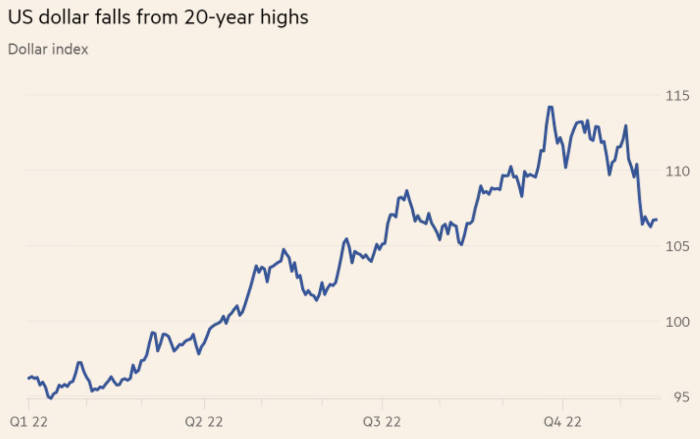(Editor’s note: There will be no news roundup Friday 25 — will be back Tuesday 29. Be safe, sane, and have a memorable Thanksgiving — if celebrating. Or come say on Discord!)
In short:
- Texas, the central US, New England, and the Carolinas are at risk of winter blackouts.
- Supply chain stresses are returning to pre-Covid levels.
- The UK faces the biggest fall in living standards on record.
Texas, the central US, New England, and the Carolinas at risk of winter blackouts; US gasoline prices falling; UK facing the biggest fall in living standards on record
The dollar has tumbled from a 20-year high as signs of inflation easing in the US are fueling speculation that the Fed will soon slow down its rate rises:

US employers are planning to increase their salary budgets by 4.6% next year, the highest expected annual jump in 15 years. However, since headline inflation is still at 7.7%, any raise below that means an employee will be earning less because their paycheck won’t buy as much.
US home sales fell for the 9th month in a row in October. Inventory is low, and prices keep rising.
The UK faces the biggest fall in living standards on record:

Supply chain stresses are returning to pre-Covid levels, and container shipping costs are down nearly 80% from a year ago:

US labor unions voted down a tentative agreement with rail management, raising the likelihood of a strike by Dec 9. Several commuter rail lines could be affected, including Metra, MARC and VRE, Caltrain, Metrolink, and Amtrak. According to the American Chemistry Council, 700,000 jobs and $160 billion could be lost in a month-long strike.
Experts warn that some herbicides will be in short supply again in 2023. Farmers are urged to plan in advance, have multiple backup plans, and to not cut back on pre-emergence herbicides. Areas affected by drought might have a bigger weed problem.
The US national average for a gallon of gasoline dropped 11 cents in the past week to $3.66. Pump prices have declined due to an increase in supply and fewer drivers fueling up. Today’s national average is 16 cents less than a month ago and 26 cents more than a year ago:

A quarter of Americans are at risk of power blackouts and grid emergencies this winter. Most at risk are Texas, the central US stretching from the Great Lakes to Louisiana, New England, and the Carolinas. Overall, though, the report is less dire than last year. Eversource Energy, one of the biggest New England regional grid operators said it will be able to cope under normal weather conditions this winter, but warned that a prolonged period of particularly cold temperatures could force it to ration electricity supply, potentially through rolling blackouts. Households using heating oil will pay 45 % more for their fuel this winter.
Here’s a relevant blog post about Lessons from Winter Storm Uri and the Texas blackout.
A Puerto Rican alternative energy company is using microgrids to decentralize power from the outdated central power infrastructure. They offer an extremely efficient turbine they call the Airmoji and they hope to be manufacturing up to 300 to 400 of them a month by early 2023.
The Mequinenza hydroelectric power plant in Spain is shutting down for the first time in 56 years due to drought. Mequinenza is the fifth-largest hydropower plant in the country. Mild temperatures are so far delaying the need for heating. If the drought continues, the decision to halt production could extend to plants in neighboring Catalonia.
European Christmas markets are scaling down to conserve energy this winter. Some are replacing ice rinks with rollerskating, and most are turning off lights earlier.
US flu hospitalization rates are highest in a decade; Dominant flu variant is particularly hard on children and seniors; High and low humidity makes Covid worse
Flu variant H3N2, which hits kids and seniors harder than other strains, is dominant in the US right now. Flu hospitalization rates are the highest in over a decade. Pneumonia, influenza, and/or Covid made up 9.4% of the deaths that occurred during the week ending Nov 12. That percentage is above the epidemic threshold of 6.2% for that week:

A new MIT study found that very dry or very humid indoor air can worsen Covid outcomes. Apart from proper ventilation, researchers found that indoor relative humidity may also influence transmission. An indoor relative humidity between 40-60 % was associated with lower rates of Covid infections and death.
‘How to think like an aerosol scientist this holiday season to stay healthy’: A professor whose expertise includes aerosols, atmospheric chemistry, and disease transmission used a CO2 measuring device as a proxy for gauging the possible presence of Covid in indoor spaces and wrote about the experiment.
Here are easy tips on how to plan this holiday season: how long either the flu, RSV, or Covid are contagious for, when to test and cadence, what to do with newborns, if someone gets sick afterward, etc.
Extreme lake-effect snowfall dumped 7 ft of snow in New York; El Niño and La Niña will become more extreme by 2030; Jackson, Mi., is taking the first steps towards a solution to its water crisis
Extreme lake effect snow dumped almost 7 ft (2m) of snow over 24 hours in NY. New York is no stranger to dramatic lake-effect snow, but this was likely the worst in the state since November 2014. At least two people died due to cardiac events related to shoveling and moving snow, and 280 had to be rescued. Here’s an explainer of what causes lake-effect snow.
If you ever wondered how much snow fell, it was at least this much:
When you get a few feet of snow… CHEERS! pic.twitter.com/t9hGUbFnS2
— Mike's Weather Page (@tropicalupdate) November 20, 2022
Here’s what to expect over Thanksgiving:
Here's an early look at #forecast high temperatures for #Thanksgiving Day:
– Slightly above normal conditions from Florida to the Great Lakes and for parts of the West Coast states.
– Slightly below normal highs in parts of the Plains/southern Rockies and portions of New England. pic.twitter.com/RRpg4ZYC2t— National Weather Service (@NWS) November 21, 2022
An affluent community in Scottsdale, AZ is going to run out of water on Jan 1. Most residents get their water from private wells, but more than 500 homeowners rely on hauled water. Foreign companies face mounting criticism over its unlimited access to Arizona water, which is reportedly used to grow crops for export. At least eight states considered implementing a new limit on foreign control of agricultural land, amid growing concern about foreign investment in US agriculture.
A new study found that El Niño and La Niña will become more extreme by 2030, decades earlier than forecast. The study finds that Australia particularly needs to prepare for more floods and droughts, and the entire world must be prepared for effects on human health, food production, global economies, and more.
Western US cities will remove decorative grass amid drought. 30 water agencies across Southern California, Phoenix and Salt Lake City and elsewhere, will target turf in places like strip malls, street medians, and at neighborhood entrances. Besides reducing ornamental grass by 30%, the agencies say they’ll add more water recycling and change how people pay for water to encourage savings.
Jackson, Mississippi, is taking steps forward in finding a solution to the city’s water crisis. The Jackson City Council approved an interim agreement with the EPA that outlines what the city needs to do to comply with the Safe Drinking Water Act.
Half of Ukraine’s energy systems have been attacked by Russia; Zaporizhzhia nuclear power plant “the world’s most dangerous place right now”; Stories about Ukrainian resistance fighters
Ukraine’s biggest energy company says people should consider leaving for the winter to reduce power demand. “If you consume less, then hospitals with injured soldiers will have guaranteed power supply. […]” Russian attacks have damaged almost half of Ukraine’s energy system. Heating and power tent have started to pop up:

The Zaporizhzhia nuclear power plant was hit by twelve blasts, likely shelling. IAEA said there had been damage to some buildings, systems, and equipment, but none of them critical for nuclear safety and security so far. Here’s why Ukrainian nuclear power plant Zaporizhzhia may be the world’s most dangerous place right now (60 Minutes interview with IAEA Director General Rafael Mariano Grossi).
The Nord Stream leak was confirmed as sabotage, but the suspects have not been identified yet.
Here’s good reporting by WaPo about Ukrainian resistance fighters.
And here are the latest updates and maps.
The rest
A 10-year-old girl helped her mother deliver a baby at home with the help of a 911 operator. She followed the operator’s instructions to a ‘T’ — both the baby and mother were fine. Miracle said she was scared but wants to be a doctor when she grows up. Here’s the young hero:

We’ve listed midwifery and first aid books in the review of best survival and prepper books.
An Alaskan snowmachiner survived after falling into ice but perished while walking back home. The victim walked about 7 1/2 miles on a trail before dying from exposure to temperatures at or below freezing.
Here’s our guide on how to survive winter emergencies, which includes how to walk on ice and survive if you fall through. And if you need to cross thin ice, do like this polar bear:
The National Distress Helpline offers 24/7 free, nonjudgmental, confidential, multilingual, crisis & emotional support to anyone in emotional distress from a disaster. These counselors provide:
- Crisis counseling for people in emotional distress related to any natural or human-caused disaster
- Information on how to recognize distress and its effects on individuals and families
- Tips for healthy coping
- Referrals to local crisis call centers for additional follow-up care and support
They can help anyone experiencing emotional distress related to disasters such as:
- Tornadoes and Severe Storms
- Hurricanes and Tropical Storms
- Floods
- Wildfires
- Earthquakes
- Drought
- Incidents of Mass Violence
- Anniversaries and Trigger Events
- Infectious disease outbreaks (such as the Covid pandemic, Monkeypox outbreak, etc.)
- Incidents of community unrest
- Other traumatic events
You may call for yourself or on behalf of someone else.
The #holiday season can be difficult for survivors of #disasters and other traumatic events. You're not alone. Call or text the national @Distressline at 1-800-985-5990 for 24/7 emotional support 💙 https://t.co/1yiDRhnGuv pic.twitter.com/yrU5usaFFF
— Disaster Distress Helpline (@distressline) November 16, 2022


You are reporting the comment """ by on